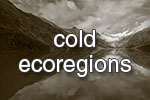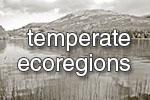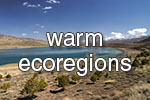Lakes in warm ecoregions - methodologies
Owing to the natural variability of surface waters and the effects of many other stressors, no simple dose–response relationships among climate change and biotic effects can be expected. Given the various types of impacts, different sets of indicators may be required.
The Europe-wide monitoring programs mainly focus (and were designed to focus) on ‘traditional stressors’, such as eutrophication, organic pollution, acidification, toxic stressors and to a lesser degree hydromorphological pressure. Other stressors such as those caused by climate change are not directly aimed on and diagnostic metrics are currently only available for these common types of degradation.
However, the overall design of WFD-compliant assessment is well-suited to detect the effects of emerging stressors, as changes in biotic communities irrespective of their causes. Thus, it is possible to include climate change effects in existing WFD metrics and adjust the existing assessment systems accordingly.
In this section a set of WFD “traditional” methodologies are suggested as assessment tools for monitoring potential changes that may be associated with climate change.
The detailed information on each methodology is given, based on the WISER project method database.
Selected methodologies
Methodologies are selected by the different biological quality elements (BQE).
See also the methods for lakes in temperate and cold ecoregions.
Benthic Diatoms, Macrophytes, Other Phytobenthos
| Name of method | Climate change related pressure | Country |
|---|---|---|
| Aquatic Flora Spanish Assessment Method | Eutrophication, Hydromorphological degradation, Impact of alien species | Spain |
Phytoplankton
| Name of method | Climate change related pressure | Country |
|---|---|---|
| Mediterranean Assessment System for Reservoirs Phytoplankton | Eutrophication | Cyprus |
| Mediterranean Assessment System for Reservoirs Phytoplankton | Eutrophication | Spain |
| Lakes and Reservoirs Biological Quality Assessment Method - Phytoplankton | Eutrophication | Portugal |
| Greek Assessment System for Reservoirs and Lakes Phytoplankton | Eutrophication | Greece |









